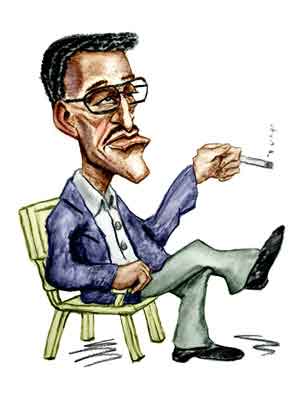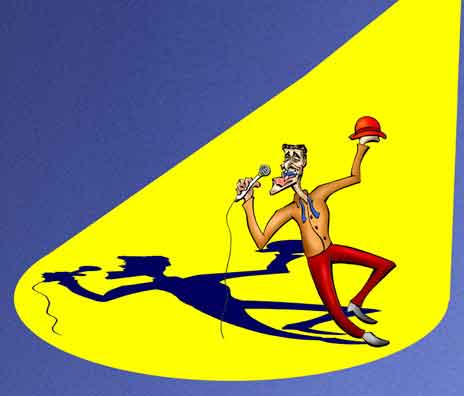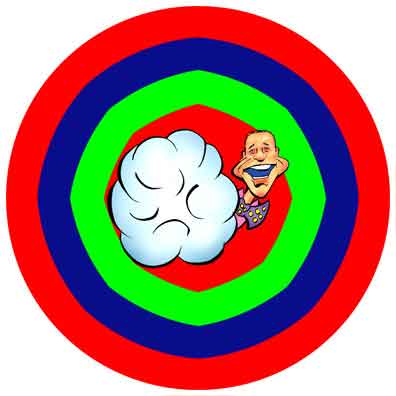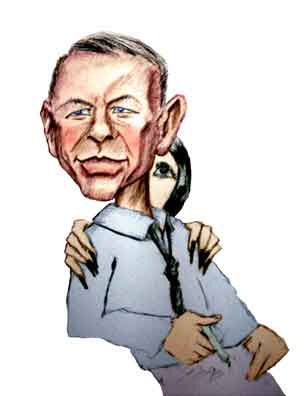Sammy Davis, Jr.
1925 - 1990

Sammy Davis, Jr.
Nothing ...
Sammy Davis, Jr. was born into a show business family, and he himself was performing almost from day one. By the time he was ten, he was a quite professional dancer and singer, and as an adult, he appeared at virtually all major casinos and night clubs. Then there were many appearances in movies and television shows. Slight of stature and without the leading man features of a Sidney Poitier, all he had to offer, he said, was his talent.
Sammy broke new ground with his part of Chip Warren on "One Life to Live" (one of the first black actors with a recurring role and which got him an Emmy). But he really shone as a guest star. He might play a priest on The Mod Squad (with Robert Duvall as a pardoned killer who once confessed to Sammy in prison) or a gang member on 77 Sunset Strip (where he put on one heck of a performance when Kookie Burns - posing undercover as a gang member - said the gang had to kill Sammy's pa so the cops wouldn't catch them).
Sammy even played cowboys. Although the reality was that during the nineteenth century fully 25 % of cowboys were African-American, it was unusual to see black actors in such roles even in the 1960's. As one of his (two) guest appearances on The Rifleman, Sammy played Wade Randall, a gunfighter who, he said, fought the bad guys and always won because of his unbeatable marksmanship. Telling the town how he had won a (fair) fight, Sammy was nonplussed when one of the man's friends stepped forward and demanded a high noon showdown. It seems the man's friend had been found three miles out of the town, shot in the back. If Wade had killed him, then Wade had gunned the man down in cold blood.
But it turned out that Wade Randall wasn't Wade Randall. His real name was Orley Fudd, a former cook. Tired of being called "Cookie" by the men, he now went from town to town bragging how he was a gunfighter when he had never been in a single fight in his life. But now he bragged at the wrong place and the wrong time and was in a heap of trouble.
Fortunately, Lucas McCain - Chuck Connors - got Sammy out of his jam pretty much the way John Wayne bailed Jimmy Stewart out in The Man Who Shot Liberty Valance. Naturally, Lucas didn't shoot the fellow, but he did make it look like Sammy was such a good shot the man decided discretion was the better part of valor.
A few words of caution about this episode for those who learn 19th Century American History from TV or Hollywood Westerns. When the bad guy challenged Orley - sorry, Wade - Sheriff Micah (Paul Fix) said he didn't like to hear that talk. But the bad guy told the Sheriff he couldn't interfere with a fair fight. So Sheriff Micah had to stand aside.
That is, to put it mildly, absolute hogwash. In the real Old West towns, you weren't even allowed to carry firearms, much less have a gunfight. No sheriff worth his salt would permit a high noon type showdown or any other in his town. And forget about the winner just riding off into the sunset. Any shootout, particularly one resulting in a fatality, would inevitably lead to an arrest and a judicial inquest. Besides, the face to face showdowns on main street were themselves a complete invention of western fiction writers. They never happened.
Historical inaccuracies aside, Sammy also donned boots and spurs in one of the better Wild Wild West episodes. He played a ranch hand who had a way with animals, and who was suspected of being behind a mysterious ghostlike figure that kept making appearances around the countryside. At first Jim was pretty tough on Sammy since Sammy gave evasive mystical answers even though his boss - played by fellow Rat Pack member Peter Lawford - had warned Sammy to answer all questions and not to be "insolent". Jim didn't like the answers Sammy gave and ordered him locked up in the smoke house. What gives? This was not the Jim West we all knew and loved.
But it was all an act. All along Sammy had been working undercover with Jim and Artie to catch a gang who had once burned a family alive in a shack. But since the criminals were now respected citizens (one was even a judge), our heroes had to move carefully. But at least in this show, there was some, if accidental, resemblance to historical reality. It was not uncommon in the Old West for men to lead dangerous and even murderous lives while young, and then settle down and become respected citizens in middle and old age. Of course, here, with Jim and Sammy and Artie to battle, they were at a distinct disadvantage. So in the end, the bad guys were brought to justice - and that included Peter who was about to blow the whole can of beans because of his guilty conscience.

... But Talent.
Episodes with Sammy always seemed to stand out, not the least was his appearance with his friend Frank Sinatra on the - quote - "children's program" - unquote - hosted by Soupy Sales. Soupy was the maitre-d' of the Chez Bippy Restuarant and Sammy, Frank, and Trini Lopez came in. After some self-satirizing repartee between Soupy and Frank, Frank complained to Sammy that he had been picking on him all the way down there. He said in a sneak preview of Von Ryan's Express (largely regarded as one of Frank's better movies) the audience cheered and whistled and hollered.

Soupy Sales
Sammy was his guest.
"What happened?" asked Sammy, "Did the reel break?"
"No, the reel didn't break," retorted Frank. "Because I saved two girls in the picture."
"Yeah." Sammy turned to Trini. "One for the producer and one for himself."
"Is there any soup on the menu?" asked Trini.
"Yeah," replied Soupy, "but we wiped it off."
Soupy brought Sammy some frogs' legs.
"Hold it," said Sammy, "one of the these frogs' legs are shorter than the other."
"What do you want, buddy?" asked Soupy. "You want to eat it or dance with it?"
Of course, by the end of the skit, everyone - Sammy, Frank, Trini, and Soupy - ended up with pies in their faces.

Frank Sinatra
One for the Producer
So why would Sammy, Frank, and Trini appear in such a slapstick skit, for which in all probability they did for minimal scale or even free? Soupy just said they were nice people.
Everyone knows that after the automobile accident that cost him his left eye, Sammy converted to Judaism. On a trip to Israel, he met Moshe Dayan. Standing with Moshe, he told the people gathered around that he was glad to meet General Dayan and how they often saw eye to eye. Sammy said the whole crowd held it's breath, but Moshe doubled up with laughter.